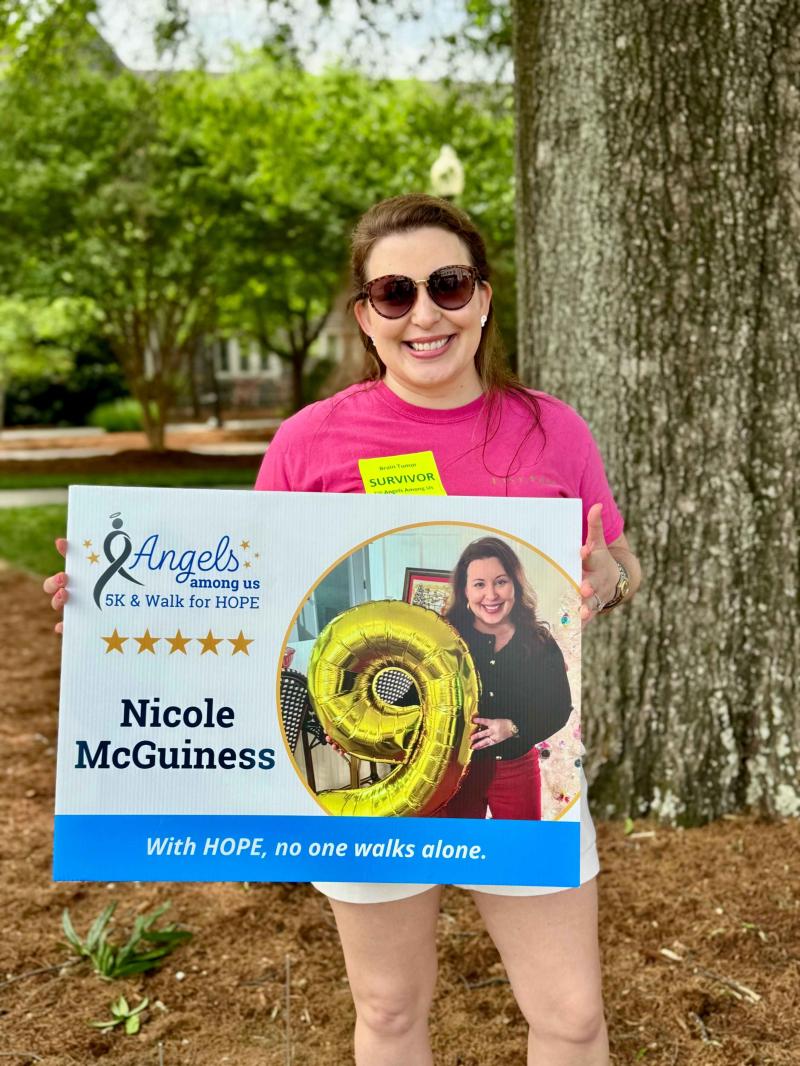
Nicole McGuinness doesn’t remember much about the morning her life changed just a few days before Christmas 2015. That morning, she called her mom and asked a simple question—“Where’s the dog food?”—and then everything went blank. She was 29 years old.
Her mother had come over to check on her and decided they needed to go to the hospital. As they arrived at the hospital and started filling out paperwork, Nicole realized something was very wrong. “I had to ask my mom, ‘Where do I work?’” she recalled. While undergoing a CT scan, she had another seizure. The doctors sedated her and told her family that they had found a mass in her brain.
Nicole’s brother began searching for brain tumor specialists in North Carolina, and the family quickly decided to bring her to Duke. That same night, she was transferred. Her friends, determined to bring a little light to a dark time, decorated her hospital room with a Christmas tree. Nicole underwent brain surgery on Christmas Eve and was released on Christmas Day.
She returned to Duke for a follow-up appointment, joined by her parents, close friends, and her partner at the time. That’s when she heard the words: grade 4 glioblastoma. “They told me I had 10 to 16 months to live,” Nicole said. “Everyone was crying, and I just said, ‘Between God and Duke, I’m going to survive. There’s a Chick-fil-A downstairs and I’m hungry—let’s go eat.’”
Later, she began six weeks of daily radiation at Duke, paired with daily oral chemotherapy (temozolomide). She also qualified for a clinical trial called ELEVATE, which focused on immunotherapy. As part of the trial, she underwent three rounds of leukapheresis to collect blood cells. Those cells were used to create personalized vaccines designed to stimulate her immune system to recognize and target any remaining glioblastoma cells. Nicole then traveled to Duke every month for 10 months to receive the ELEVATE immunotherapy injections, administered in her groin area. For the first four years, she had an MRI every two months, followed by every three, then four, and now every six months. The tumor, roughly the size of a golf ball at diagnosis, has never returned. Each MRI since has been described as a “boring brain,” which Nicole says is the best kind of brain to have.
Nicole is now a 10-year survivor. Along the way, she’s faced other health challenges, including thyroid cancer, also treated at Duke. Through it all, she’s remained grounded by three things: her faith, her support system, and Duke. “I don’t know why these things are happening,” she said, “but I’m so thankful I’ve been at Duke this entire time.”
From the beginning, Nicole felt like more than just a patient. “When I come to Duke, there’s a family atmosphere. They ask about my life, my family. Everyone remembers you,” she said. “They play an active role not just in helping you fight for your life, but in caring about who you are.”
Soon after her surgery, her college friends formed a team to participate in the Angels Among Us 5K. That first event, just months after her surgery, was an emotional milestone. “It’s difficult to put into words. Seeing the caregivers, the other patients, the support—it’s remarkable.” A few years in, Nicole was invited to carry the survivor banner. “I’ve never made it through that first song without crying,” she said. “Hearing the kids sing, thinking about what their little bodies are going through—it’s overwhelming. But I remember thinking how grateful I was that they were being treated at Duke.”
Nicole credits a great deal of her strength to mindset. “I’ve always tried to stay positive. That’s not easy when someone tells you that you have 10 to 16 months to live, but I believe attitude plays a huge role. I’m not saying you can’t be sad—but trying to find the good, appreciating the small things, that’s what helps. A beautiful sunset, matching socks from the dryer ... the little things matter.”
Now, with ten years behind her and no sign of tumor recurrence, Nicole remains full of gratitude. “I don’t know what’s kept me alive—my clinical trial, chemo, radiation—but I know it’s Duke.”